Managing Site Access Rules
Chellie Esters
Joseph Yarborough (Unlicensed)
Anastasia Medovkina (Deactivated)
Setting up site access rules allows you to improve the on-site technician compliance.
Please contact ServiceChannel to have the Site Access functionality enabled.
Users with the Site Access Admin secondary role can configure site access rules and add exceptions to them.
- Click the menu icon in the upper-left corner, and navigate to Admin > Site Access Rules.
- Configure the desired site access rules and exceptions, and then click Save at the bottom of the page to apply the changes.
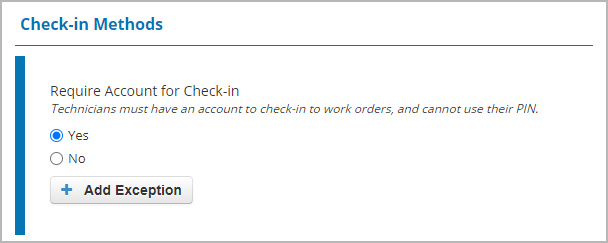
Configuring Site Access Rules
On the Site Access Rules page, admins can configure rules that affect how technicians check in and check out. Read below for detailed information on each rule.
Inform providers about the enabled site access rules that may change how technicians check in and check out.
Below are Site Access rules that you can configure.
- Require Account for Check-In
- Disable IVR Check-In
- Display Outside Operational Hours Text
- Geolocation Radius
- Prevent Check-In Outside Geolocation Radius
- Acceptable Check-In Timeframe
- Automatic Checkout
- Prevent Checkout Outside Geolocation Radius
- Require Badge Scan on Check-In
- Rescan Existing Check-Ins
- Rescan Repeat Visitors
- Outside Operational Hours Check-Ins
- Outside Acceptable Timeframe Check-Ins
- Outside Geolocation Check-Ins
Check-In Methods and Options
In the Check-In Methods and Check-In Options sections, you can adjust rules for the technicians’ check-in process, such as whether techs need to have a technician account to check into work orders, if the IVR system is enabled for check-in, whether techs can clock in outside the acceptable GPS radius, and more.
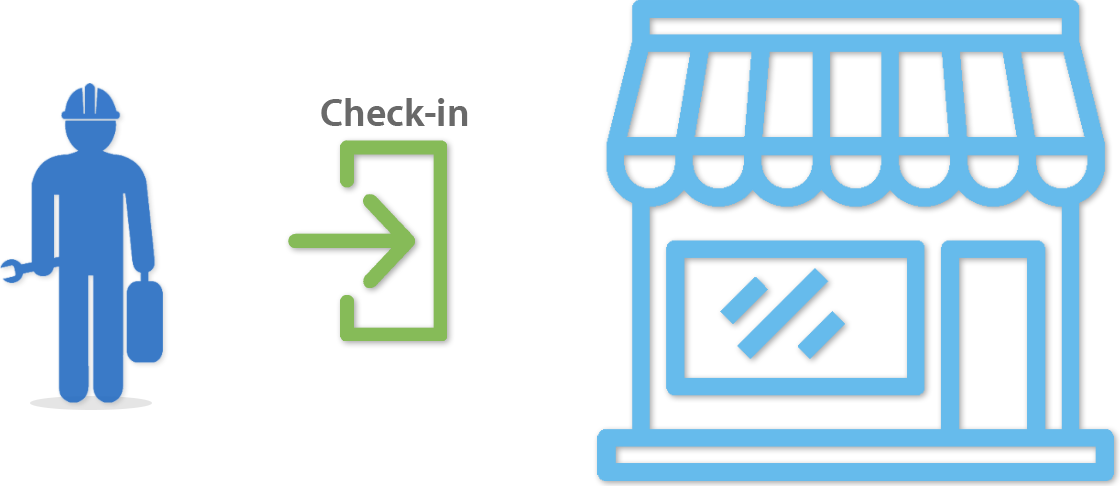
You can also get visibility into technicians' compliant and non-compliant check-ins by configuring the radius within which a technician’s check-in will be considered compliant and on-site.
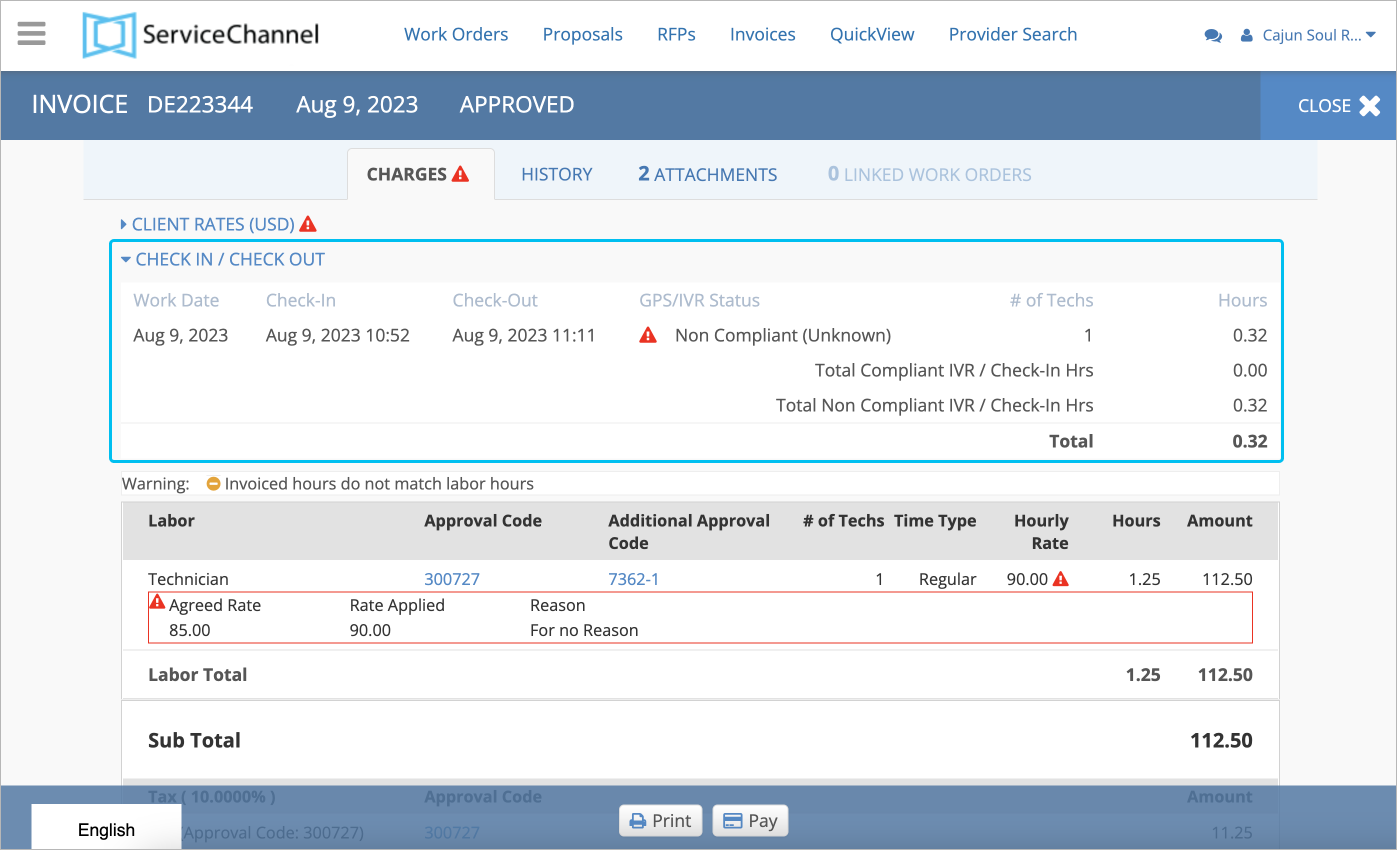
If the technician checked in out of the radius, you would see such check-in as non-compliant on the Work Order Details and Invoice Details pages.
Contact your ServiceChannel manager to enable the feature.
Please, contact your ServiceChannel representative should you need to change the decimal point (.) to decimal comma (,) on non-monetary amounts, such as:
- Hours and Duration
- Quantity Amounts
- Weight.

For clients who are using the Compliant and Non-Compliant Check-Ins feature, you will no longer have the Prevent Check-in Outside Geolocation Radius and Prevent Check-out Outside Geolocation Radius sections on the Site Access Rules page. Technicians can check in anywhere, but you will see whether the check-in is compliant or non-compliant.
- To configure compliant and non-compliant check-ins, specify the geolocation radius in the Check-Ins Options section.
When a technician clocks in or out via the ServiceChannel Provider mobile app, their location is determined relative to the work order’s location through the GPS service. When a check-in/out is outside the radius, it will be marked as 'non-compliant.'
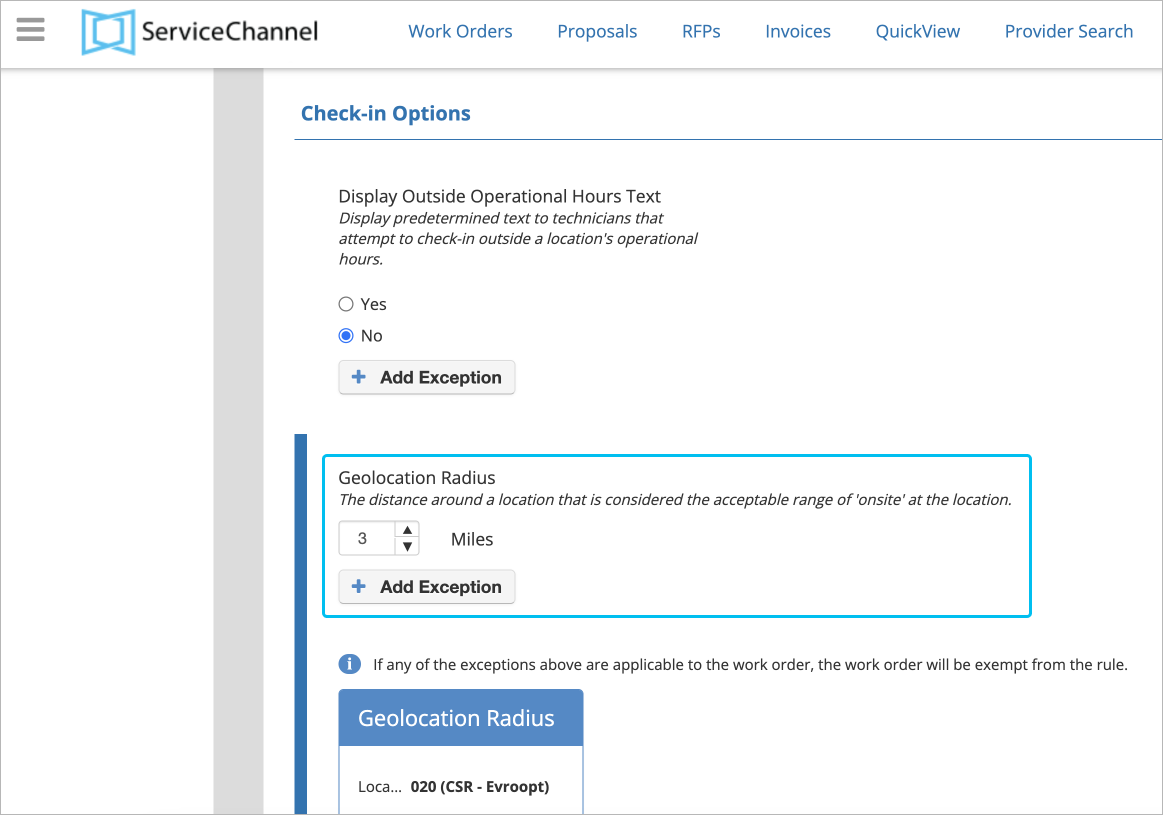
In the image above, the geolocation radius is set to 2 miles around locations. When a technician gets closer than 2 miles to a work order’s location — which is tracked through the GPS service on their mobile device — their check-in is considered compliant, and you will see it on the Work Order Details page and Invoice Details page.
Should a technician be further than 2 miles from a location, they still can check in, but you will see that their check-in is non-compliant on the Work Order Details page and Invoice Details page.
Note that:
- GPS is considered 'Unknown' when the GPS coordinates or the location addresses are not correctly set up in the Locations module.
- When the Site Access Rules are not set up, compliant and non-compliant check-in/outs will be calculated within a 2-mile radius.
Check-In Methods
Require Account for Check-In
Сhoose whether you want to allow technicians to check into work orders only after signing in to ServiceChannel Provider with their technician account and not a PIN.
| ✅ Yes | Technicians can check into work orders only if they signed in to ServiceChannel Provider using the login and password of their technician account. If they signed in with a PIN, they cannot check in. EXCEPTIONS You can add exceptions to this rule for specific locations, providers, and trades to allow technicians to check in without a technician account. In ServiceChannel Mobile, location employees can see the name and photo of techs who have a technician account, which allows them to make sure that the people who arrived on-site are those who were expected to come. |
|---|---|
| ❌ No | A technician account is not required for technicians to check into work orders. They can use their PIN to sign in. |
Disable IVR Check-In
Decide whether you want to disable the option to check into work orders via the IVR system for technicians.
| ✅ Yes | Technicians cannot check into work orders via IVR. They will be required to use the ServiceChannel Provider mobile app if they attempt to do so. EXCEPTIONS You can add exceptions to this rule for specific locations, providers, and trades to allow technicians to use IVR upon check-in. |
|---|---|
| ❌ No | Checking into work orders via the IVR system is allowed. |
Check-In Options
Display Outside Operational Hours Text
Choose whether you want to display a predefined message to technicians in ServiceChannel Provider when they try to check in outside of the location’s operational hours.
| ✅ Yes | A message that you enter in the Outside Operational Hours Text field is displayed in ServiceChannel Provider to those technicians who attempt to check in when a store is closed. Click here to view an example.
You may remind technicians the business hours of the location they are trying to access and provide them with instructions on how to proceed. |
|---|---|
| ❌ No | Technicians who check in outside of the location’s business hours don’t get any message in ServiceChannel Provider. |
EXCEPTIONS You can add exceptions to this rule — whether you turned it on or off — to tailor messages to show to technicians for specific locations, providers, and trades. You may create a custom message for each exception.
Geolocation Radius
Specify how close a technician should be to a store to be able to check in or out. Geolocation radius is an acceptable distance around a location within which a technician is considered to be on-site. When a technician clocks in or out via the ServiceChannel Provider mobile app, their location is determined relative to the work order’s location through the GPS service.
Whether or not a tech can check in or check out outside the set radius depends on how you configure the corresponding rules.
To set the acceptable radius, enter a value between 0.1 and 99.9 in the Miles field.

In the image above, the geolocation radius is set to 2 miles around locations. When a technician gets closer than 2 miles to a work order’s location — which is tracked through the GPS service on their mobile device — they are considered to be on-site and can perform a check-in/out without any restrictions related to the GPS radius.
Should a technician be further than 2 miles from a location, whether they can check in or out depends on the rules you enable. You may prevent techs who are not on-site from checking in or checking out.
EXCEPTIONS You can add exceptions to this rule to adjust the allowed GPS radius for specific locations, providers, and trades.
Prevent Check-In Outside Geolocation Radius
Decide whether you want to prevent technicians from checking in outside the specified geolocation radius using ServiceChannel Provider.
Clients using the Compliant and Non-Compliant Check-Ins feature will no longer have the Prevent Check-in Outside Geolocation Radius and Prevent Check-out Outside Geolocation Radius sections on the Site Access Rules page. Technicians can check in anywhere, but you will see whether the check-in is compliant or non-compliant.
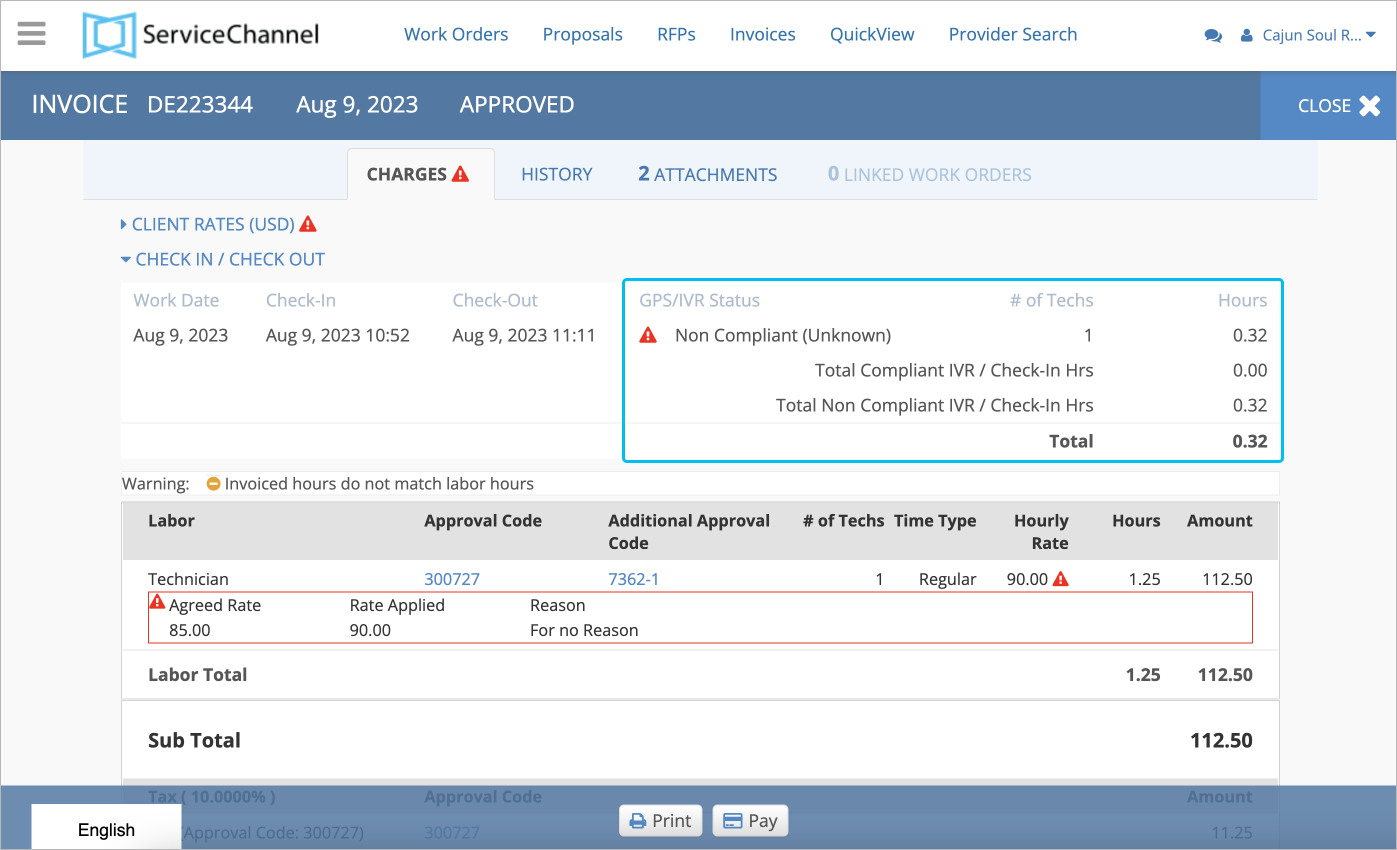
| ✅ Yes | Technicians cannot check in via the ServiceChannel Provider mobile app outside the acceptable GPS radius around a work order’s location. |
|---|---|
| ❌ No | Technicians can check in from anywhere using the ServiceChannel Provider mobile app. Should they be outside the acceptable radius, they see a notification but can still check in. EXCEPTIONS You can add exceptions to this rule to prevent technicians from checking in outside the allowed GPS radius for specific locations, providers, and trades. |
Acceptable Check-In Timeframe
Set the acceptable check-in time frame around the scheduled time of a work order to notify store employees when technicians check in too early or late:
- Under Early, set the earliest time in minutes or hours prior to the scheduled time.
- Under Late, specify the latest time in minutes or hours after the scheduled time.
To set the time, pick either Minutes or Hours in the dropdown, and then enter a value in the field.
- Minutes: Enter a number between 1 and 59.
- Hours: Enter a number between 1 and 24.

Enabling this rule does not prevent technicians from checking in.
EXCEPTIONS You can add exceptions to this rule to set a custom check-in time frame for specific locations, providers, and trades.
Check-Out Options
Under Check-Out Options, you can configure rules that determine the check-out flow:
- If techs get automatically checked out of work orders after the specified period of time
- Whether they can check out outside the acceptable GPS radius
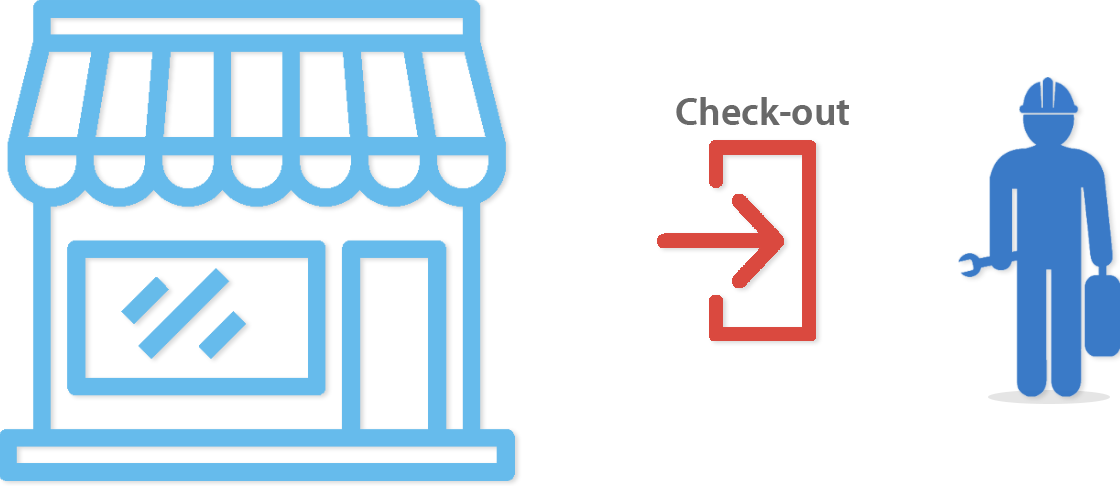
Automatic Checkout
Choose whether you want technicians to be automatically checked out of work orders after being checked in for the number of hours you specify. Enabling this option allows you to avoid situations when a technician stays checked in for too long because they forgot to perform a check-out.
| ✅ Yes | A technician gets automatically checked out after being checked in for the number of hours you specify under Checkout Timeframe. Enter the number of hours between 6 and 24.
Click here for a detailed explanation of the provided example. In the image above, the check-out time frame is set to 6 hours. Technicians are automatically checked out of work orders 6 hours after they checked in if they haven’t performed a check-out. EXCEPTIONS You can add exceptions to this rule to set a different check-out time frame for specific locations, providers, and trades. |
|---|---|
| ❌ No | No automatic check-out occurs when a technician hasn’t checked out. |
Requiring Electronic Signature
During the check-out process of completing a work order, you can decide on whether you want FTMs and/or Non-FTMs to add a Required Electronic Signature. Enabling this option allows you to provide an additional way for technicians to verify completion. You do have the option for making the Electronic Signature an optional step or disabling the step from the completion check-out process. When the Required Electronic Signature is enabled, there is the ability to add FTMs and Non-FTMs to an exception list, which means, they are not required to add the signature during the check-out completion process. Optional Electronic Signature allows the technician the choice to provide a signature while Disable Electronic Signature means they are not required to add one.
You can create a custom style exception list for your work order signatures. You can do so by:
- Location
- Provider
- Trades
- Categories
- Priorities
The drop-down menu for each section allows you to select an exception to add work orders that will not require a signature. At any time, exceptions can be modified and removed.
- Click the Require Electronic Signature radio button to enable.

- Optional: Click the +Add Exception button to add the exceptions.
- Optional: Use the drop-down arrow to select a specific exception from each section.
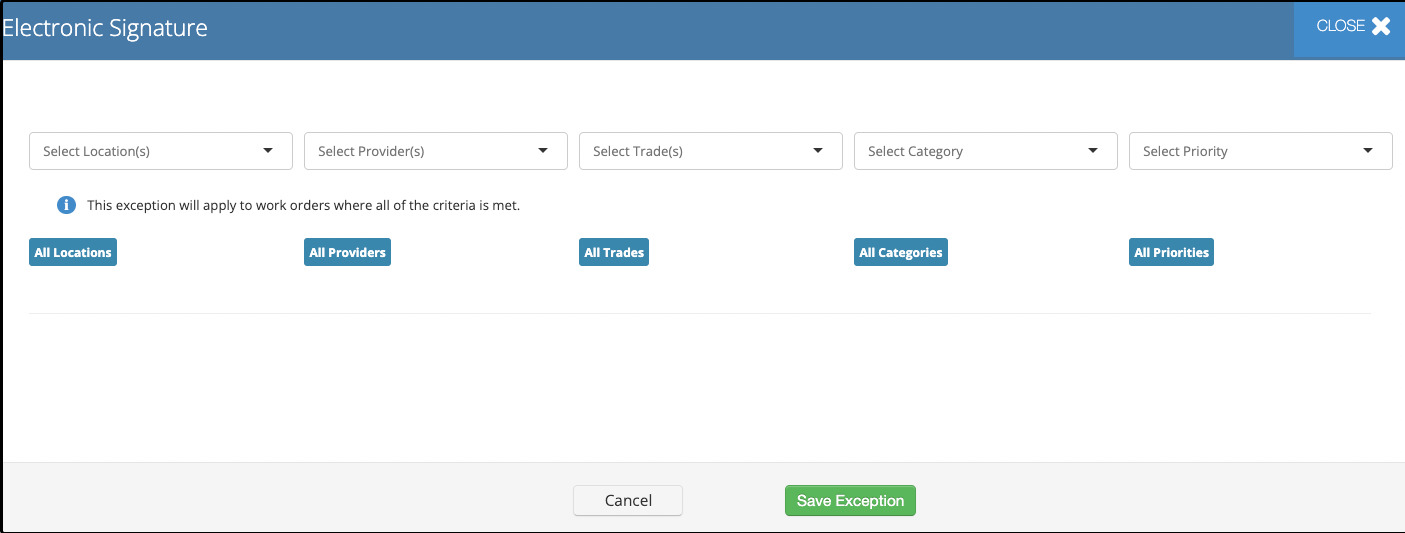
- Optional: Click the Save Exception button to confirm the selection.
- Click the Save button to confirm the Required Electronic Signature option.
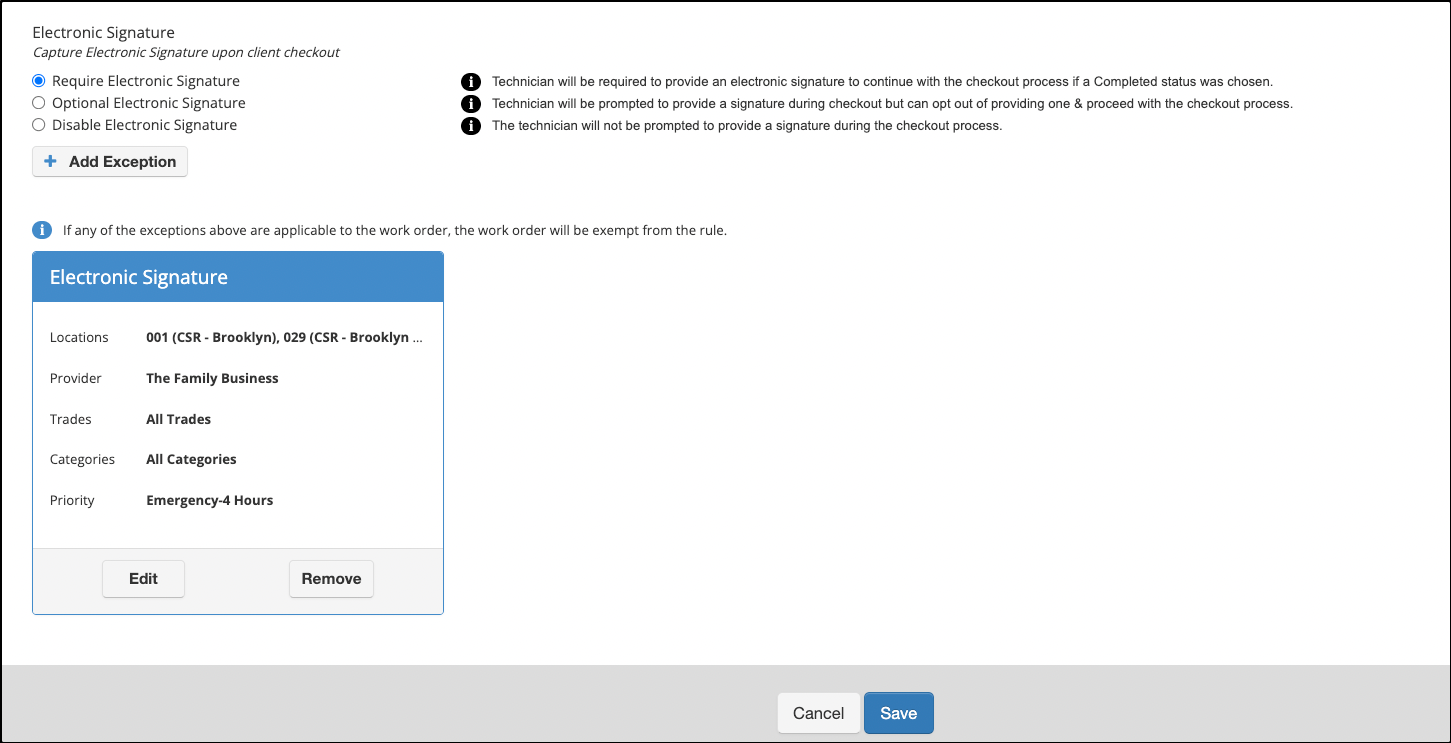
Prevent Checkout Outside Geolocation Radius
Choose whether you want to prevent technicians from checking out of work orders outside the acceptable GPS radius via the ServiceChannel Provider mobile app.
If you are using the Compliant and Non-Compliant Check-Ins feature, you will no longer have the Prevent Check-in Outside Geolocation Radius and Prevent Check-out Outside Geolocation Radius sections on the Site Access Rules page. Technicians can check in anywhere, but you will see if the check-in is compliant or non-compliant.

| ✅ Yes | Technicians can check out only within the acceptable GPS radius around a work order’s location via the ServiceChannel Provider mobile app. |
|---|---|
| ❌ No | Technicians can check out from anywhere using the ServiceChannel Provider mobile app. EXCEPTIONS You can add exceptions to this rule to prevent technicians from checking out outside the specified radius for particular locations, providers, and trades. |
Badge Scanning Options
A badge is a unique QR code generated for a technician’s work order in the ServiceChannel Provider mobile app that a location employee can scan to verify a technician’s identity before they can check in. You may empower location personnel to verify technicians by scanning their badges via the ServiceChannel Mobile app before granting techs access to a location. Learn more information in Site Access for SC Mobile.
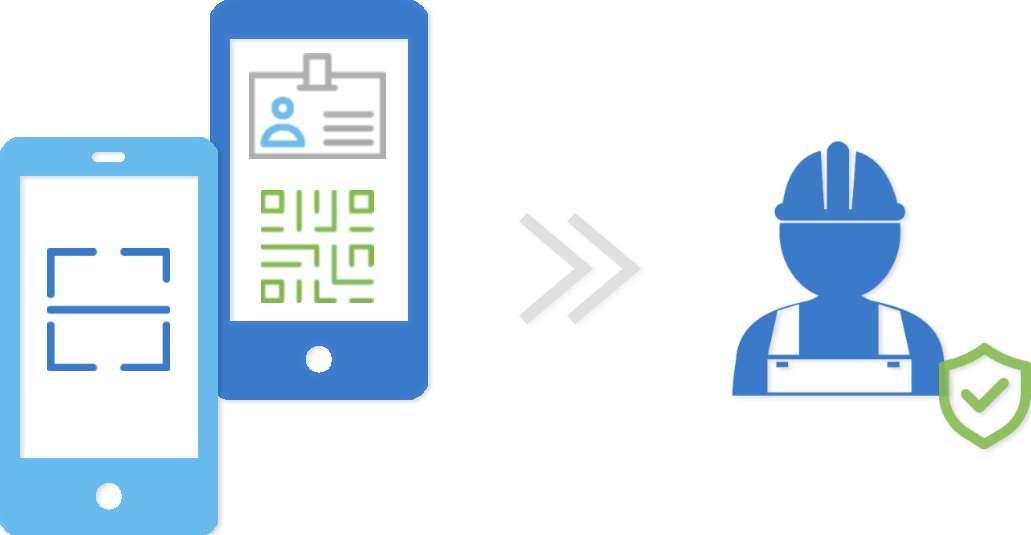
Contact your ServiceChannel representative to enable this feature.
Require Badge Scan on Check-In
Decide whether you want store personnel to verify a technician on-site by scanning their badges before they can start work on the service request.
Location employees need to use the ServiceChannel Mobile app to scan badges.
| ✅ Yes | Enable the badge scanning rule. Once you’ve selected Yes, you can configure other rules to set conditions that trigger the badge scanning requirement. Read below for more info. EXCEPTIONS You can add exceptions to this rule to disable the badge scanning rule for specific locations, providers, and trades. |
|---|---|
| ❌ No | Scanning a badge is not required. Technicians can check into work orders without having their badge scanned by location staff. |
The rules listed below become available only when the Require Badge Scan on Check-in rule is turned on.
Rescan Existing Check-Ins
Choose whether you want employees to rescan a badge of a technician who has recently checked into the same or another work order at the same location.
| ✅ Yes | Rescanning a badge is required regardless of whether a technician has recently checked into the same or another work order at the same location. EXCEPTIONS You can add exceptions to this rule to disable the badge rescanning requirement for specific locations, providers, and trades. For each exception, you may set a time frame between technician’s check-ins within which rescanning a badge is not required. Click here for details on how to set the time frame between check-ins in exceptions. In the lower-left corner of the exception overlay, pick either Minutes or Hours in the dropdown, and then enter a value in the field.
|
|---|---|
| ❌ No | Rescanning a badge is not required within the specified time frame between technician’s check-ins at the same location. Under Existing Check-In Timeframe, pick either Minutes or Hours in the dropdown, and then enter a value in the field.
Click here for a detailed explanation of the provided example. In the image above, the time frame between technician’s check-ins is 24 hours. When the technician comes back to a location within 24 hours after their last check-in, their badge doesn’t need to be rescanned. Badge scanning may still be required if prompted by other rules. |
Rescan Repeat Visitors
Decide whether you want employees to rescan a badge of a technician who has previously checked in at the same location.
| ✅ Yes | A store employee is required to rescan a technician’s badge regardless of how many times the tech has successfully checked in at the same location. EXCEPTIONS You can add exceptions to this rule to disable the badge rescanning requirement for specific locations, providers, and trades. |
|---|---|
| ❌ No | Rescanning a badge is not required for a technician who has successfully checked in at the same location the specified number of times. Under Repeat Check-In Count, enter a number of successful technician’s check-ins. The number should be in the range between 1 and 999.
Click here for a detailed explanation of the provided example. In the image above, the number of successful check-ins is set to 10. After 10 successful check-ins, a technician isn’t required to have their badge rescanned. Badge scanning may still be required if prompted by other rules. |
Outside Operational Hours Check-Ins
Select whether badge scanning is required for a technician who tries to check in outside of a store’s business hours.
| ✅ Yes | An employee is required to scan a badge of a technician who wants to check in outside of the location’s operational hours. EXCEPTIONS You can add exceptions to this rule to disable the badge scanning requirement for specific locations, providers, and trades. |
|---|---|
| ❌ No | No badge scanning is required for a technician who attempts to check in when a store is closed. Badge scanning may still be required if prompted by other rules. |
You may enable the rule to show a custom message to technicians who try to check in outside of the location’s business hours.
Outside Acceptable Timeframe Check-Ins
Decide whether badge scanning is required for a technician who attempts to check in outside of a work order’s acceptable check-in time frame — the period of time around the scheduled time when a technician can clock in.
| ✅ Yes | Badge scanning is required for a technician who wants to perform a check-in outside of a work order’s acceptable check-in time frame. EXCEPTIONS You can add exceptions to this rule to disable the badge scanning requirement for specific locations, providers, and trades. |
|---|---|
| ❌ No | No badge scanning is required for technicians who try to check in outside the acceptable check-in time frame. Badge scanning may still be required if prompted by other rules. |
Outside Geolocation Check-Ins
Choose whether badge scanning is required for technicians who attempt to check in outside the acceptable GPS radius using the ServiceChannel Provider mobile app.
| ✅ Yes | Badge scanning is required for technicians who try to check in outside the acceptable GPS radius around a work order’s location. EXCEPTIONS You can add exceptions to this rule to disable the badge scanning requirement for specific locations, providers, and trades. |
|---|---|
| ❌ No | No badge scanning is required for technicians who attempt to check in outside the acceptable GPS radius around a work order’s location. Badge scanning may still be required if prompted by other rules. |
Adding Exceptions to Site Access Rules
When configuring site access rules for technicians, you may create exceptions to each rule and exclude specific locations, providers, trades, or any combination of them from the rule.
Make sure you create unique exceptions for a single rule.
- On the Site Access Rules page, configure the desired role by selecting either Yes or No. Should exceptions be available for the picked option, the Add Exception button appears below the rule.
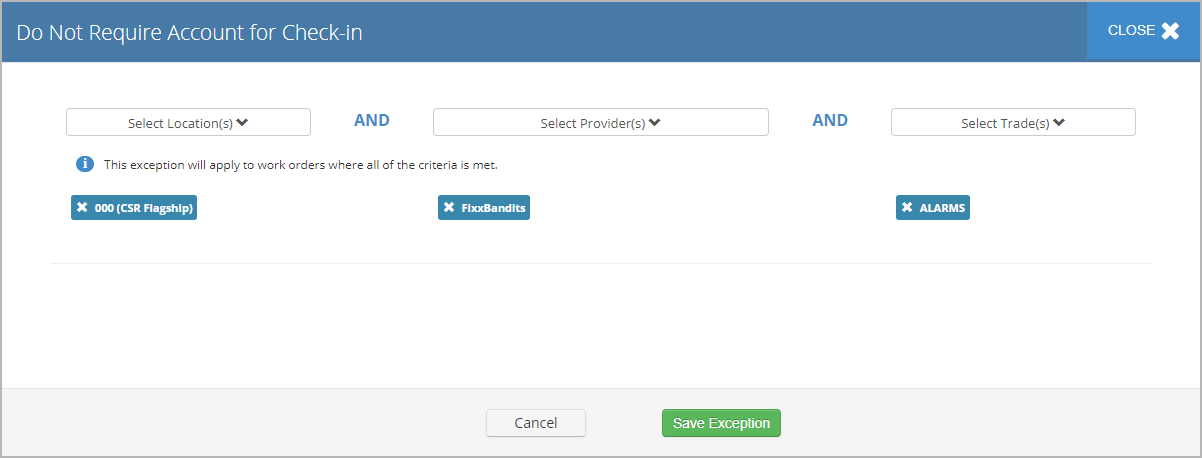
To create an exception, click Add Exception. The exception overlay opens.

In the overlay title, you can see what action will be applied by the exception. It explicitly states how the exception works, so be sure to double-check the title upon creating exceptions to avoid errors.

- In the overlay, select the locations, providers, and trades that you want to exclude from the site access rule. Select All [Items] in the dropdown if needed.
When finished, click Save Exception. The exception appears as a card below the rule.
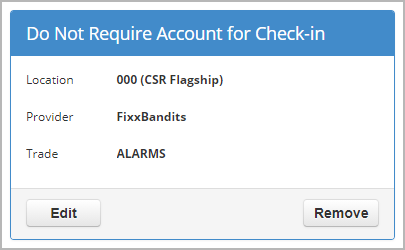
To modify an exception, click Edit, and apply the desired changes in the exception overlay. To delete an exception, click Remove.
To add another exception to the rule, repeat steps 2–4.
When you add more than 3 exceptions to a single rule, you see the count of hidden items on the third card. Click the dimmed exception to view all of them.

- Once you have configured all site access rules and exceptions, hit Save at the bottom of the Site Access Rules page to confirm the changes.
Below is an example of creating exceptions for the Require Account for Check-in rule.
You decide to enable the rule by setting the toggle to Yes, which means that technicians need to have a technician account to check into work orders.

Then, you add the following exceptions:
| Exception # | Locations | Providers | Trades |
|---|---|---|---|
| 1 | 000 (CSR Flagship) | FixxBandits | Alarms |
| 2 | All | Joe Media Audio Visual | Audio Video |

The enabled Require Account for Check-In rule and the exceptions you added will apply as follows:
✅ ALL technicians are required to sign in to ServiceChannel Provider with their technician account to check into work orders,
❌ EXCEPT
- Technicians of the FixxBandits provider who check into work orders belonging to the trade Alarms at location 000 (CSR Flagship);
AND - Technicians of the Joe Media Audio Visual provider who check into work orders belonging to the trade Audio Video at any location.
-
Page:
-
Page:
-
Page:
-
Page:
-
Page:
-
Page:
-
Page:
-
Page:




